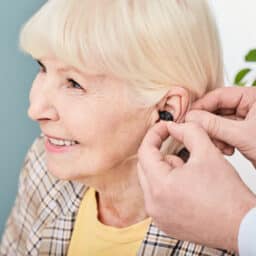What to Know About Acoustic Neuromas

Acoustic neuromas are noncancerous, slow-growing tumors on the vestibular nerve, the main inner ear nerve responsible for sending balance information to the brain. Also called vestibular schwannomas, acoustic neuromas arise when Schwann cells wrap around or cover the vestibular nerve. Although acoustic neuromas are noncancerous, large or quickly growing neuromas can press against the brain…
Join Us for October’s Hard of Hearing Class

WHEN: October 25, 2023TIME: 7:00p.m. – 8:00p.m.WHERE: Virtual ClassCOST: $100 This class is casual, interactive and fun! It will be taught by our TEAM of an audiologist and speech-language pathologist. Family members, friends and all communication partners are encouraged to join. Call today to sign up! (732) 750-4660
Safety Tips for People with Hearing Loss

Living with hearing loss is an adjustment, and it can affect multiple aspects of your life, including your safety. The good news is that there are plenty of steps you can take to keep yourself and your home safe when you have hearing loss. Use Hearing Aids to Hear Important Sounds Did you know that…
JOIN US!

A NEW Class for Hard of Hearing Patients WHEN: September 27, 2023 TIME: 7:00pm – 8:00pm WHERE: Virtual Class COST: $100 This class is casual, interactive and fun! It will be taught by our TEAM of an audiologist and speech-language pathologist. Family members, friends and all communication partners are encouraged to join. CALL…
How to Enjoy Music Without Risking Hearing Loss

Hearing loss can come from many sources, including aging, illness and physical trauma to the ear, but one of the most common causes is damage from excessive noise. The advent of smartphones, in-house speaker systems and car radios have left us more exposed to hazardous noise than ever. Approximately 50% of people aged 12-35 could…
What Is Auditory Processing Disorder?

Auditory processing disorder (APD) disrupts the way the brain understands sound input. The disorder causes the brain’s auditory system to miss or misinterpret speech sounds. Let’s examine the prevalence, symptoms and identification of auditory processing disorder. How Common Is Auditory Processing Disorder? A study on support systems for those with APD found that an estimated…
Tips For Protecting Your Hearing at Sporting Events

If you’re a sports fan, you know nothing beats the rush of seeing your favorite team play at their home stadium. All the cheers, music playing and the roar of the crowd can be exhilarating. Unfortunately, it can also pose a risk to your hearing health. Loud Environments Increase Hearing Loss Risk Exposure to loud…
What Lifestyle Changes Help Relieve Tinnitus Symptoms?

Tinnitus is a ringing, buzzing, hissing, clicking or roaring in the ears. Some causes include but are not limited to: While tinnitus has no known cure, there are several things you can do to try and manage the symptoms. Stress Reduction Not only has stress been shown to trigger tinnitus symptoms, but tinnitus itself can…
Vacation Packing Tips for People With Hearing Loss

Taking a summer vacation can be a great way to relax, and traveling with hearing loss is not uncommon. A reported 15% of American adults report some degree of hearing loss. Whether jetting off to an island vacation from Newark Airport or camping near Lake Hopatcong, doing a little hearing loss packing preparation can help…
Can Using Headphones Lead to Tinnitus?

Listening to music on your headphones can help you focus on work or motivate you during your walkout at Becker Park. However, it’s important to listen at a reasonable volume; otherwise, you may be putting yourself at risk for hearing loss and tinnitus. Tinnitus Symptoms Tinnitus is a common problem affecting millions of Americans. It’s…